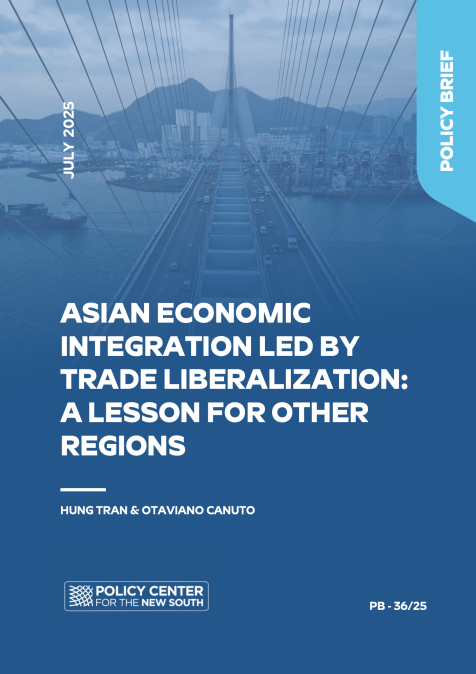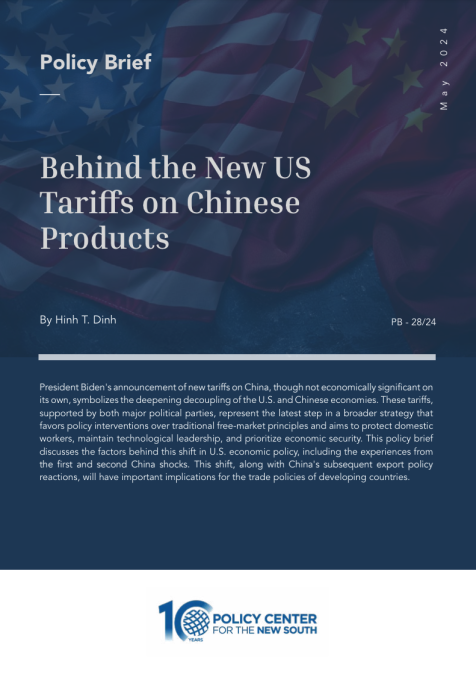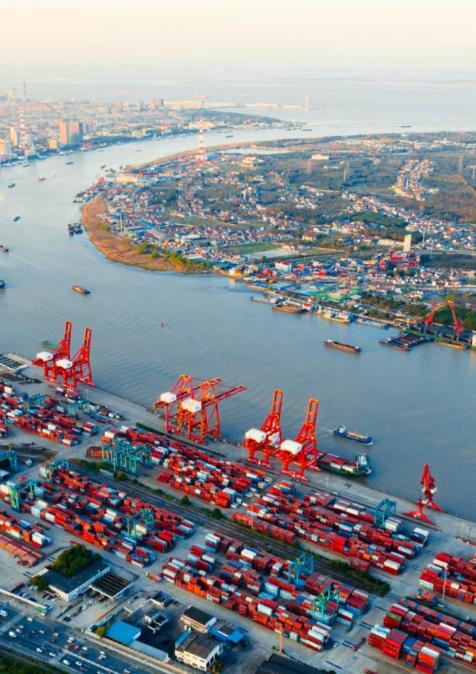Publications /
Opinion
Jointly organized by OCP Policy Center and Shanghai Institutes for International Studies, the roundtable on "Current African Economic and Strategic Challenges and Opportunities; Intersecting Views from China and Morocco" was a great opportunity to gather experts from both side, to brainstorm opportunities to enhance the role of think-tanks and civil society organization in the consolidation of the Afro-Asian cooperation more efficiently and in a more comprehensive way.
The seminar organized on March 9th, 2016 at OCP Policy Center in Rabat has raised an extensive number of topics related to both strategic and up-to date current challenges and opportunities that face the mainstream trends of Chinese-African partnerships.
The seminar was an opportunity from both Moroccan and Chinese experts to make a radioscopy of the three main areas:
1/ The positioning of both china and Morocco in the global economy, and its effects on their engagements in Africa and then the opportunities to increase the prospects for more effective, focused and innovative partnerships between the two countries;
2/ The valuation of the current security situation in Africa, either in its conventional aspects associated to zones of conflicts and tensions, or with the emerging non-conventional threats of terrorism mainly in North Africa and Sahel.
3/ The role of think-tanks in the Improvement of the performance of Chinese-African Cooperation, and in the enhancement of the sense of initiative by accompanying stakeholders and policy makers on the basis of South-South spirit and win-win prescription.
Morocco’s hybridity in economy, human development, as well as in searching opportunities to enforce its capacity to play the role of the Inter-continental linking hub in smart and new areas (such as renewable energy, services, aeronautic, automobile) were similarly emphasized in the debates.
- China – Morocco – Africa Interactions in the Global Economic Context
Indeed, in a context of a maintained macroeconomic stability, and an improved business environment, Morocco has experienced rapid growth during the first decade of this century. The annual growth rate of GDP has increased gradually. Morocco has successfully pursued a strategy based on the expansion of domestic demand, particularly in public investment.
It was likely, that debates devoted a convenient panel to assess and to examine the strengths and weaknesses of the China-Africa cooperation, with a focus on enhancing the Morocco-China relations to be more efficient, with an extended output at the domestic as well as the regional level.
With its "Going out" policy China has shifted from ideology to pragmatism by focusing on trade and investment. The strategy of "two resources and two markets" have encouraged Chinese firms to invest in Africa.
In addition, it appears that the China Africa Cooperation Forum (FOCAC) has significantly strengthened China-Africa relations. Chinese investments in Africa have grown significantly since the early 1990s. Over the past 15 years since the inception of FOCAC in advancing the comprehensive and in-depth development of China-Africa relations.
The China-Africa cooperation is expected to extend to new Fields of ¨Railway, Highway, Regional Aviation Networks and Industrialization, making good use of existing cooperation mechanisms such as the Joint Working Group of Transnational and Trans-regional Infrastructure Cooperation in Africa, and to promote practical cooperation between China and the African Union in priority fields¨.
Food Security and the modernization of African agriculture is also remaining an important way to the increase of agricultural production, processing and income, and safeguard food security in Africa.
During the Johannesburg Summit and the 6th Ministerial Conference of FOCAC held from 3 to 5 December 2015, the adopted action plan 2016-2020, initiated huge financial assets to strengthen the terms of cooperation between china and African countries through:
- The set-up of China-Africa production capacity cooperation fund, with an initial pledge of US$10 billion, to support China-Africa industry partnering and industrial capacity cooperation.
- The scale up of its investment in Africa, and the increase of China's stock of direct investment in Africa to US$100 billion in 2020 from US$32.4 billion in 2014;
- The scale up of trade and promotion of the China-Africa trade volume to US$400 billion in 2020 from US$220 billion in 2014 ensuring that the rate of growth is maintained in overall trade figures and that balance in trade is the desired outcome;
- The Chinese compromise to African countries for US$35 billion of loans of concessional nature on more favorable terms and export credit line, and the creation of new financing models, optimizing favorable credit terms and conditions, and expanding credit scales to support China-Africa industrial capacity cooperation, infrastructure building, and development of energy resources, agriculture, and manufacturing in Africa;
- The extension of the China-Africa Development Fund from US$5 billion to US$10 billion;
- The extension of the Special Loans to Support Small and Medium Sized Enterprises in Africa from US$1 billion to US$6 billion;
Nevertheless, the new trend of Chinese involvement is not limited to the financing. It is framed initially by "the 21st Century Maritime Silk Road", which emphasizes the mutual promotion of a beneficial cooperation in the blue economy.
It was within this framework that Moroccan-Chinese relationship was a primary concern of most presentations, either in questioning the conceivable prospects to correct the commercial balance between the two countries, or in prospecting non-conventional areas of cooperation. These may take the advantages of Moroccan economic dynamism in the speed-up and in the efficiency of Chinese initiatives delivery process in Africa.
- Economic and Cultural Factors Further Morocco China Partnerships
During the last two decades, Morocco has been able to reach both positive effects in economic, and in terms of human development. It has therefore been able to assure a grow rate adjacent to its potential rate.
Indicators of such improvements were clear in the area of basic infrastructure services (water, electricity and roads, particularly in rural areas), and in increasing the life expectancy of the grassroots community and to reduce poverty and vulnerability - despite persistent unemployment -.
Morocco has followed a very pragmatic approach by reforming its investment policy and improving the business climate, to be able to provide a good national treatment to foreign investors and to promote responsible business conduct. In turn, it becomes gradually a privileged destination for foreign investors.
Indeed, debates have focused their awareness on emerging new areas of cooperation not only within the narrow bilateral framework, but also with the perspective that china-morocco would escort each other in the continent, mainly in the area of food security, energy, and logistics.
Today, Moroccan exportation to China is still limited to 557,7 million dollars in 2012, despite of the minor rise reaching 17,25% comparing to 2011 ( around 475,6 Million dollars). This is against 3.26 billion dollars importations from China. But potentiality of the growth of this promoting partnership was illustrated by different speakers in the form of joined-ventures and tripartite cooperation either under the umbrella of the FOCAC, the Sino-Arab Forum, or at the bilateral level within the Chinese New Silk Road initiative.
Speakers have also stressed that civilizational primacy of the two countries, their cultural rooting are also another assets to open the cooperation to a wider spheres of partnership between the two countries to go beyond the approach based on the balance of trade, or the theory of energy markets searching, to take a strategic turn that make china and morocco channels that bridge each other to different directions of the globe including Africa, Asia, the Atlantic, and Mediterranean.
- China - Sub-Saharan Africa’s Interactions in the Regional Security Context
At the security level, Speakers have reviewed the current security situation in both Africa and MENA, with a focus on lately emerging hot spots of threats, either in conventional postures ( borders vulnerability, failed states, ethnic conflicts inherited from the last century), or by the new configuration of a new terrorism trend generated by groups distributed along the Atlantic belt to the coasts of the Horn of Africa.
Analysis was focused on groups such as Ansar as-Sharia, Boko Haram, As-Shabab, AQIM, and ISIS tracing a corridor to terrorism stretching from the Mediterranean (Libya) to Nigeria (Atlantic) through Niger, Chad and Cameroon. And consequently open an area of illicit activities that include small and medium weapons traffic, kidnapping, narcotic traffic, and other form of challenges that slow down economic growth, hinder investment and shrink opportunities of intercontinental cooperation.
Terrorist threats have now taken center stage as without doubt the most dangerous and worrying problem we face in the world today. At the close of historical wars of ideology, and with the emergence of a newly globalized world – a world underpinned by the open exchange of intelligence commerce and knowledge – we are now at last grasping the vital importance of this very globalization in dealing with the challenges posed by these terrorist threats. Indeed, this battle has become a rallying point for all those who believe in a better future for humanity – a future lived under the banners of peace, coexistence and the rule of law.
Therefore, both countries - China and Morocco - have expressed a deep interest to cooperate may cooperate in the area of security and peace building in Africa.
For instance, Morocco, almost the most stable and peaceful country in the MENA, has built up a proactive approach in facing terrorism threats with equanimity, quietude and determination, in the frame of an anticipatory vision that always keeps in mind the legal, intellectual and practical regulations designed to foster stability.
Moroccan performance in countering terrorism has revealed how effective this experience has proven to be in confronting the terrorist phenomenon. The features of treachery and surprise that characterize such terrorist acts – banned religiously, morally and legally – are indicators of just how unique have been the pre-emptive efforts made by Morocco in this regard.
For China, besides its war against some terrorist spots in the north of China, It has been so vigilant for the security of its citizens living in the MENA and Africa, and for its economic investment abroad. That is the reason why China has come to an agreement by the end of last year to open its first naval base in Africa, and signed a ten-year leasing agreement with Djibouti to build a logistical hub.
Three dimensions might explain such move:
1. Defensive, as it is a multistate service provider, and strategic monitoring defense hub
2. Strategic, since the level of China's establishment of a permanent facility in this region marks a critical step in the maritime expansion and strategic creation of a Chinese "blue water" navy capable of operating globally.
3. In terms of legitimacy, china interprets it as an extension to previous activity. China believes that in accordance with relevant UN resolutions, it has deployed more than 60 vessels in the Gulf of Aden and the waters off the Somali coast in 21 anti-piracy escort missions since 2008. But since China faces difficulties in replenishing soldiers and resupplying fuel and food, it found it necessary to have nearby and efficient logistical support.
In fact, despite of Chinese resistance to sponsor multilateral defense projects, it has accepted during the last FOCAC summit in Johannesburg (2015), to provide the AU with US$60 million of free military assistance over the next three years (2016-2019). China has also admitted to support the operationalization of the African Peace and Security Architecture, including the operationalization of the African Capacity for the Immediate Response to Crisis and the African Standby Force.
China has a long history in providing the UN peace keeping operations by forces. Chinese contribution is not limited in the significant number of “Blue Helmets”, but also in delivering combat troops, civilian police, military observers, engineering battalions and medical units.
At least, china and Morocco could collaborate effectively in the area of fighting terrorism, exchanges of expertise and the information sharing, speakers concluded.
To success all these, knowledge and the sense of innovation are the appropriate tools that can facilitate and assist the process of policy making to reach their objectives. Think Tanks are the convenient platform to offer such services. Think-Tanks could efficiently play a key-role as facilitators for the decision-making processes and the consolidation of the culture of smart management of international partnerships.










